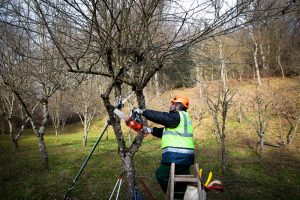Winter has arrived! So that means it’s time to start pruning your deciduous fruit trees. Pruning unproductive branches help produce reliable crops with quality fruit. If you’re like us and you didn’t get sweet fruit last year it’s probably caused by the high rainfall and not enough hot and sunny days. Be sure to use clean and sharp tools and remove the branches you cut away from the tree. Mulch 5-6cm around the base of the tree when you are finished to ensure moisture is retained in the soil. You can spray your peach and nectarine trees at the beginning of spring when the buds swell with a lime sulphur or copper oxychloride to help kill off any spores and reduce the chances of Peach Leaf Curl and other fungal problems. In late winter use a dormant oil spray on apples, plums and pear trees that had leaf curl caused by aphids or scale insects.
Our TreeWorks arborists have some tips for pruning this winter to get the best out of your fruit trees:

It’s time to prune your fruit trees
Apples trees
For pruning apple trees, find the central leader branch and prune competing branches. Be sure to also remove terminal (the shoot on the end of each branch tip) to six buds. Avoid pruning laterals because they grow spurs for next season’s fruit. Prune on an angle ¼ of an inch past the bud. Remember to remove low branches and any crossing.
Peach, apricot and plum trees
When pruning plum trees, open up the centre of the tree to let light in and air circulate. The goal is to train the tree into a vase shape with 9 strong branches (reduce the taller, thin growth). Leave spurs and laterals for fruit.
Pear trees
Pear trees fruit on flowering spurs and the tip of 1-year laterals. Leave these to produce next year’s fruit. Prune the terminal, remove the criss crossing branches to allow ventilation and sunlight.
